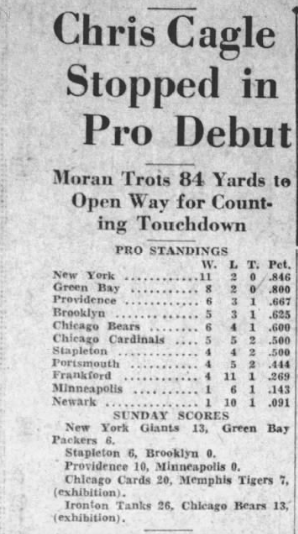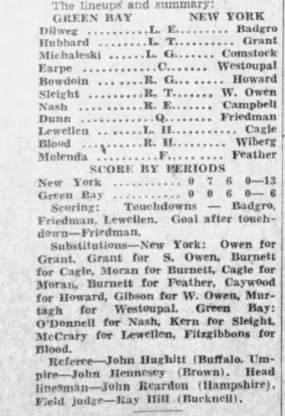Good call on ’27.
In 1930, led by Benny Friedman’s 4th straight year topping 1,000 yards passing, the Giants dropped an early decision to Green Bay before winning 8 straight and then dropping a game to the Bears to run their record to 10-2. The Packers record was only marred by a loss to an Ernie Nevers’ led Cardinals team, so their record sat at 8-1 going into the big game (The headline emphasizes it was the Pro debut of former army star Chris Cagle):

- 30-1-giants-packers-headline.png (171.32 KiB) Viewed 19053 times

- 30-2-giants-packers-box.png (132.26 KiB) Viewed 19053 times
A long pass from Friedman to Badgro scored one New York touchdown, and an 84-yard run by Hap Moran set up Friedman’s one-yard plunge for the winning margin as the Giants defeated the Packers 13-6.
Unfortunately for the Giants, the rest of the season didn’t go as planned. They lost to Staten Island on future Giant’s star Ken Strong’s PAT, then dropped a second 7-6 game to Brooklyn with former Giant Jack McBride scoring all Dodger points, giving the Packers the title by just four percentage points.
Final Standings:
Green Bay Packers 10-3-1 .769
New York Giants 13-4 .765
Chicago Bears 9-4-1 .692
Footnotes:
(#1) On 12-14, the Giants defeated a group of Notre Dame All-Stars including the Four Horsemen coached by Knute Rockne by a score of 22-0 and raised $100,000 for the New York Unemployment Fund (remember this was during the Great Depression).
(#2) If modern winning percentage calculations are applied to the Giants and Packers records for the 1930 season, the Giants would be the champs! It's all about whether or not tie games are included in the calculation. And the Packers were pretty darn good, this was the middle year of a 3-peat for them.
(#3) If Benny Friedman hadn't hurt his knee against the Stapletons on Thanksgiving and then missed the subsequent game against the Dodgers on the following Sunday, things may have turned out differently. In my opinion, one of the weird things about the pre-32 NFL, is that sometimes the “defacto” championship would take place, but there were still a few games that followed it where teams could get tripped up by a trap game, or mental letdown, etc. In the pre-NFL era, those big games were often right at the end like we see in modern times.